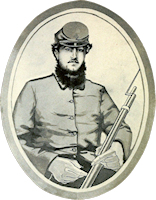CAMP, WINTER QUARTERS, April 21st, 1864.
My Dear Sister:
Once more in our same old quarters, though we little thought a week ago that we would ever live to see them again. We had a very quiet time on picket this week, at the same time the most pleasant we have had this winter. Only one day and night of rain, the rest of the time the most delightful kind of weather. The boys when not on duty amused themselves at various sports, some fishing, some digging ground hogs out of their holes (an animal that I never saw until I came to Virginia), while nearly the whole regiment amused themselves gathering wild onions. The doctors recommend them very highly on account of their preventing scurvy. Gen. Ransom had a kettle for each company brought down the line, for the purpose of cooking them. We had one man from our regiment Company D. to desert while on his post. He left his gun and accoutrements and swam the river.
Last Tuesday the Yankees had a tremendous cannonading going on for upwards of two hours. Just across the river we could hear the balls flying through the air also hear them explode. The most reasonable supposition of the cause was that they were practicing previous to their attacking us. We have a rumor today that they have fallen back towards Centerville, whether it be true or not, there were plenty of them on the river this morning when we left. Col. Grimes took our band down with us this time, and every night they would get on a high bluff on the banks of the river and give the Yankees a serenade, closing with “Dixie” and the “Old North State.” Sometimes one of their bands would strike up in answer. The week before we went down, there was a Yankee Sergeant deserted and came over to us, reporting that Grant was to have attacked us last Sunday morning. The whole picket force were under arms that morning two hours before day ready to receive him. I was on the outpost that night and just before day, could not help from wishing that they would come across and attack our breastworks. But Sunday came and passed and everything remained quiet on both sides.
The man who told you we were suffering for bread was mistaken. Our meat is very slim, though we make out very well. As for bread we get more than we can eat. There is not a man in our company who has not got him a bag of extra meal, gradually increased from his daily rations. We draw just as much sugar and coffee as we could wish for. Meat is the only thing we are stinted with. We have not drawn any beef or ham in a month or two. We have (that is General Lee has) just received an official telegram from North Carolina stating that Gen. Hoke had captured sixteen hundred prisoners and twenty-five pieces of cannon at Plymouth, that’s cheering news indeed, particularly from North Carolina. I hope Washington and Newbern may fall likewise. My love to all.
Your devoted brother,
WALTER.
A soldier of the Legion lay dying in Algiers,
There was lack of woman’s nursing, there was dearth of woman’s tears;
But a comrade stood beside him, while his lifeblood ebbed away,
And bent, with pitying glances, to hear what he might say.
The dying soldier faltered, and he took that comrade’s hand,
As he said, “I never more shall see my own, my native land;
Take a message, and a token, to some distant friends of mine,
For I was born at Bingen, – at Bingen on the Rhine.”
His trembling voice grew faint and hoarse,
His grasp was childish, weak, –
His eyes put on a dying look, –
He sighed and ceased to speak.
His comrade bent to lift him,
But the spark of life had fled, –
The soldier of the Legion in a foreign land is dead!
And the soft moon rose up slowly,
And calmly she looked down
On the red sand of the battle-field,
With bloody corses strewn,
Yes, calmly on that dreadful scene
Her pale light seemed to shine,
As it shone on distant Bingen, – fair Bingen – on the Rhine.
– CAROLINE E. NORTON.
Letters from two brothers who served in the 4th North Carolina Infantry during the Civil War are available in a number of sources online. Unfortunately, the brothers are misidentified in some places as Walter Lee and George Lee when their names were actually Walter Battle and George Battle. See The Battle Brothers for more information on the misidentification.
